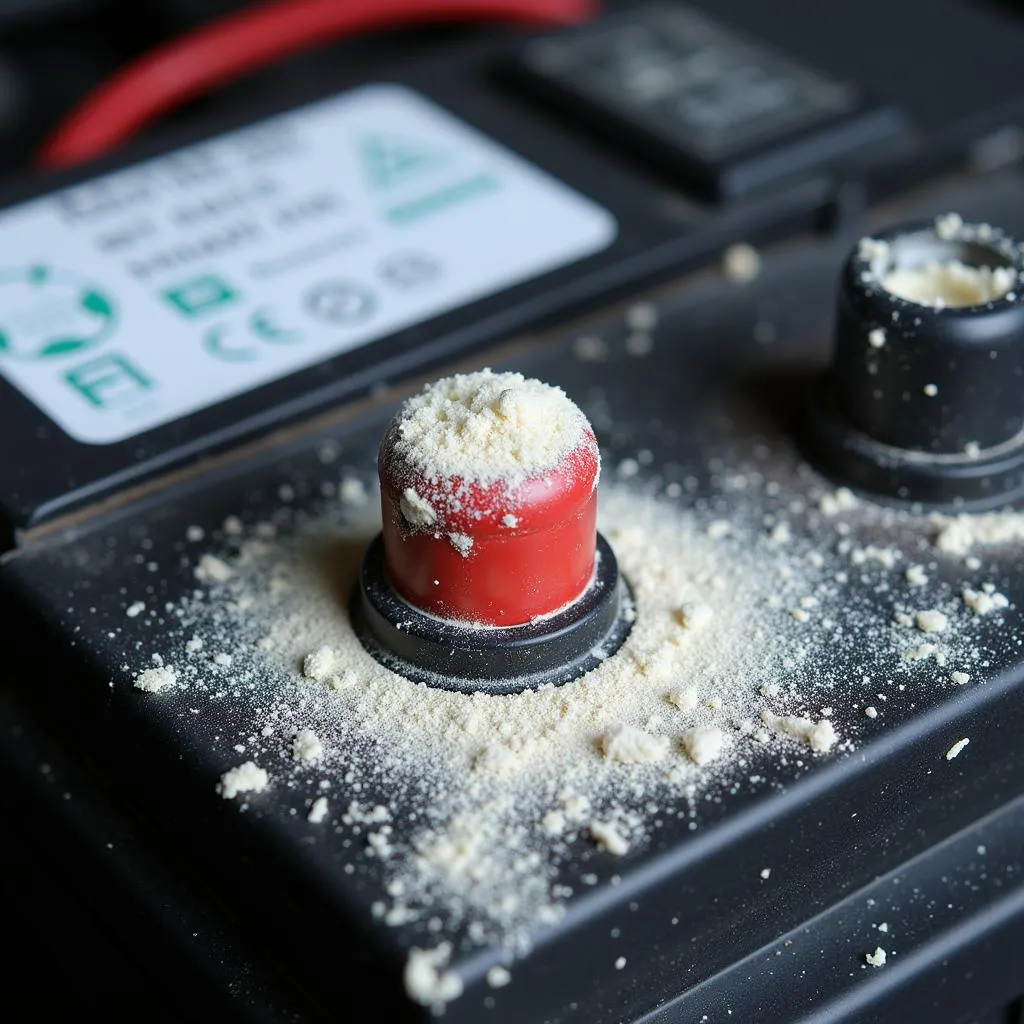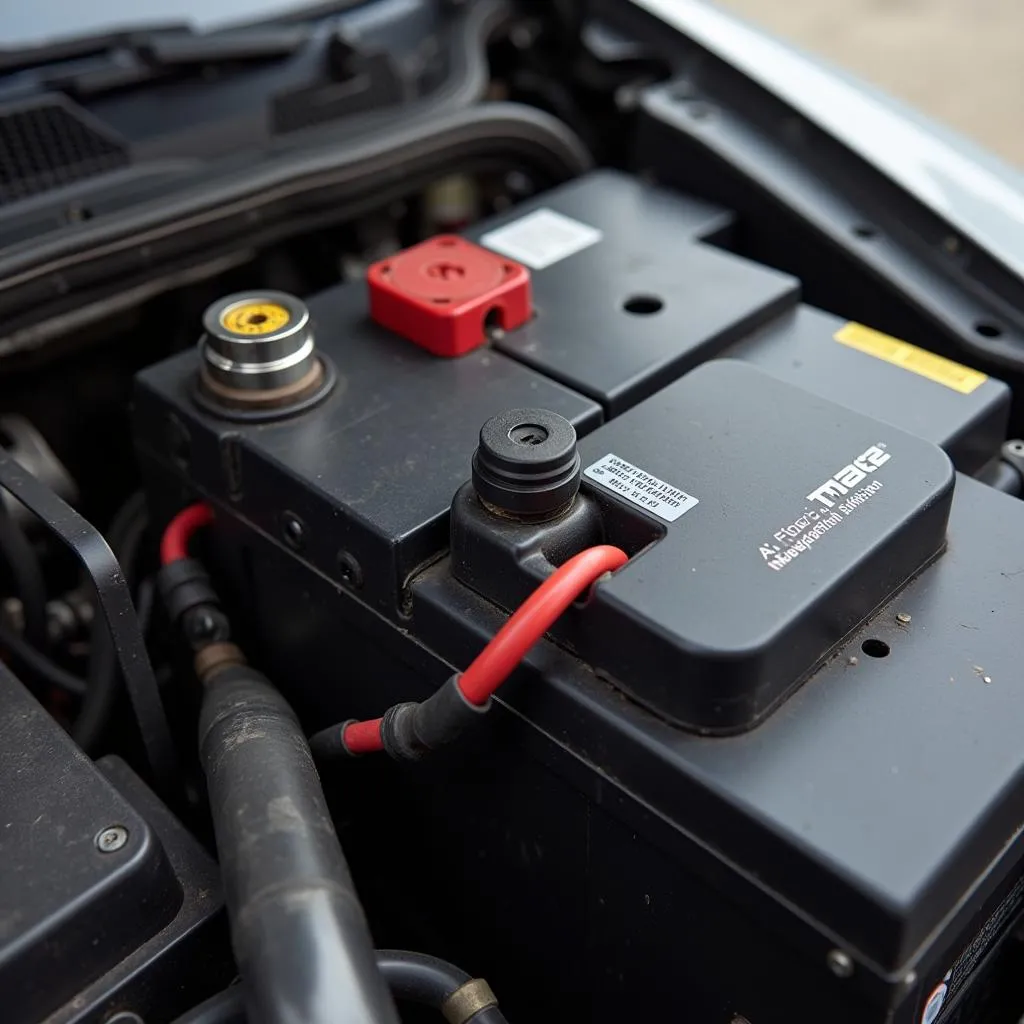You’re sure your car battery is charged – the lights come on, the radio works – but when you turn the key, nothing happens. Frustrating, right? This problem is more common than you might think, and thankfully, the solution isn’t always as complicated as it seems. This article will delve into the reasons why your car battery might be charged but not starting, and provide you with the knowledge to get your vehicle running smoothly again.
 Corroded Car Battery Terminals
Corroded Car Battery Terminals
Understanding the Basics: How Car Starting Systems Work
Before we dive into the potential issues, it’s helpful to understand how a car starts. When you turn the key or push the start button, your car battery sends an electrical current to the starter motor. The starter motor then engages with the engine’s flywheel, setting the engine in motion and beginning the combustion process.
This process relies on several key components, including:
- Battery: Stores electrical energy and provides the initial power to the starter.
- Starter Motor: An electric motor that receives power from the battery to crank the engine.
- Alternator: Charges the battery and powers the car’s electrical system once the engine is running.
If any of these components fail or experience issues, your car may not start, even if the battery itself holds a charge.
Common Reasons for a Car Battery Charged But Not Starting
While a dead battery is a common reason for a car not starting, there are several other possibilities if you’re sure your battery is charged:
1. Faulty Starter Motor
The starter motor is a complex piece of machinery, and like any other part, it can wear out over time. If the starter motor is faulty, it may not be able to engage with the engine properly, even with a fully charged battery.
Signs of a faulty starter motor:
- Clicking sound when you turn the key.
- Grinding noise when starting the car.
- Engine cranks slowly.
2. Bad Ignition Switch
The ignition switch is responsible for sending power to the starter when you turn your key. A faulty ignition switch can prevent the starter from receiving the necessary power to start the engine.
Signs of a bad ignition switch:
- Car starts intermittently.
- Key gets stuck in the ignition.
- Dashboard lights flicker or die when starting the car.
3. Corroded Battery Terminals
Corrosion on your battery terminals can interrupt the flow of electricity from the battery to the starter. Even a small amount of corrosion can be enough to prevent your car from starting.
Signs of corroded battery terminals:
- White, powdery substance on battery terminals.
- Difficulty starting the car, especially in cold weather.
 Loose Car Battery Cable
Loose Car Battery Cable
4. Loose or Damaged Battery Cables
Loose or damaged battery cables can also interrupt the flow of electricity, similar to corroded terminals. This interruption prevents the starter from receiving sufficient power to start the engine.
Signs of loose or damaged battery cables:
- Visible damage to battery cables (cracks, fraying).
- Battery terminals feel loose when wiggled.
5. Failed Alternator
While a failed alternator won’t prevent your car from starting once, it will prevent the battery from recharging. This means that after starting your car, the battery will eventually drain, and you won’t be able to start it again.
Signs of a failed alternator:
- Dimming headlights and interior lights.
- Battery warning light illuminated on the dashboard.
- Whining noise coming from the engine.
6. Fuel System Issues
Believe it or not, sometimes the issue isn’t with your electrical system at all. If your car isn’t getting fuel, it won’t start, even if the battery and starter are working perfectly.
Potential fuel system issues:
- Empty fuel tank
- Clogged fuel filter
- Faulty fuel pump
7. Other Electrical Problems
Beyond the components listed above, there are other electrical problems that can prevent your car from starting. These include:
- Blown fuses: Check your fuse box for any blown fuses related to the starting system.
- Faulty relays: Similar to fuses, faulty relays can interrupt the flow of electricity.
- Wiring issues: Damaged or corroded wiring can prevent the starter from receiving power.
Troubleshooting Your Car Starting Problem
When faced with a “car battery charged but not starting” situation, follow these steps to diagnose and potentially resolve the issue:
- Check for Obvious Signs: Begin by inspecting the battery terminals for corrosion and ensuring the battery cables are securely fastened.
- Jump Start Attempt: Try jump-starting your car using jumper cables and a known good battery. If the car starts, it suggests a severely depleted battery or a charging system problem (alternator).
- Listen for Sounds: When attempting to start, pay attention to any clicking, grinding, or whining sounds. These can indicate problems with the starter motor or other components.
- Test the Battery Voltage: Use a multimeter to test the battery’s voltage. A fully charged battery should read around 12.6 volts.
- Inspect Fuses and Relays: Locate the fuse box and inspect the fuses related to the starting system for any blown fuses. Check for faulty relays as well.
- Seek Professional Help: If these troubleshooting steps don’t pinpoint the issue, it’s best to consult a qualified mechanic. They have the expertise and tools to accurately diagnose and repair the problem.
Preventing Future Starting Problems
Regular car maintenance is crucial for preventing future starting problems. By proactively addressing potential issues, you can avoid the inconvenience and frustration of a car that won’t start.
- Battery Maintenance: Clean your battery terminals regularly with a baking soda and water solution to prevent corrosion. Check and tighten the battery cables periodically. Consider replacing your battery every 3-5 years.
- Starter and Alternator Checks: During routine maintenance, ask your mechanic to inspect the starter and alternator for any signs of wear or damage.
- Address Warning Signs: Don’t ignore warning signs like dimming headlights, unusual noises, or difficulty starting. Addressing these issues early on can prevent more serious problems down the line.
Conclusion
Experiencing a car that won’t start even with a charged battery can be incredibly frustrating. By understanding the potential causes and following the troubleshooting steps outlined in this article, you’ll be well-equipped to address the issue and get back on the road. Remember, regular maintenance is key to preventing future starting problems and ensuring your vehicle operates reliably.
FAQs
Q: My car makes a clicking sound when I try to start it. What does this mean?
A: A clicking sound usually indicates a problem with the starter motor. It could mean the starter is failing, the battery connections are loose, or the battery itself is too weak to engage the starter.
Q: Can a bad alternator prevent my car from starting even with a charged battery?
A: While a bad alternator won’t prevent a single starting attempt, it will eventually lead to a dead battery. If your alternator is faulty, your battery won’t recharge while driving, and you’ll likely experience starting problems in the future.
Q: How often should I replace my car battery?
A: Car batteries typically last between 3 to 5 years, but various factors like climate and driving habits can impact their lifespan. It’s a good idea to have your battery tested regularly and consider replacement as it nears the end of its expected lifespan.
Q: My car has power but won’t crank. What could be the problem?
A: If your car has power (lights, radio) but won’t crank, it could indicate a problem with the starter motor, ignition switch, or a related electrical component. Read more about cars with power but won’t crank here.
Q: How can I tell if my car battery is dead or if it’s something else?
A: Learn more about determining if your car battery is dead here.
For additional information on this topic, explore these related articles:
- Battery vs Alternator vs Starter: Understanding the Difference
- Car Makes No Sound When Trying to Start
- Difficult to Start Car: Causes and Solutions
If you’re still experiencing trouble, don’t hesitate to reach out to our expert team for assistance. Contact us via WhatsApp: +1(641)206-8880, Email: [email protected] or visit our location at 276 Reock St, City of Orange, NJ 07050, United States. Our dedicated customer support team is available 24/7 to help you get back on the road.